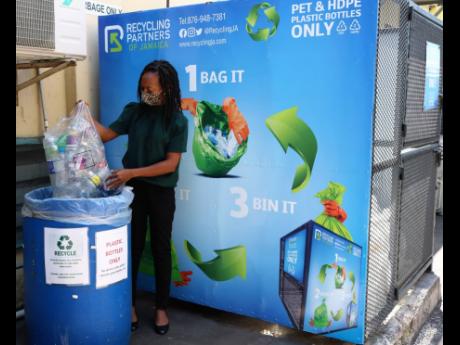Salada working to reduce carbon footprint….one plastic bottle at a time

Known as a roasted coffee company for more than 60 years, Salada Foods Jamaica Limited is moving to reduce its carbon footprint and in the process achieve a bonus of overall improved efficiencies in its operations. The company recently joined the Recycles Partners of Jamaica (RPJ) network of businesses which collect plastic bottles made from polyethylene terephthalate (PET) and high-density polyethylene (HDPE), both of which are derived from petroleum and whose appeal for manufacturers lies in the fact that they can easily be shaped into bottles and containers for packaging foods and beverages, personal-care products, and many other consumer products. When The Gleaner team visited the factory at 20 Bell Road, off Spanish Town Road, Kingston, General Manager Tamii Brown and Quality Assurance Manager Nadine Francis were excited to share the progress Salada has made since getting involved just about two months ago. In addition to a metal cage for storing the bottles, the company also has 55-gallon capacity drums at strategic locations, such as the entrance to the canteen. “Our focus this year has just been on efficiency, in how can me do things better, including in our plant. How do we address the issue of waste management, how can we be a little cleaner with our approach?” Brown asked. “It’s making sure that as a corporate entity when we look behind, that footprint is something that we can be proud about.” Francis had for years been looking for a way to reduce the negative impact of the many plastic bottles she saw in her work environment, given the potential for pollution when they got out into the solid waste stream. “We do use a lot of bottles because we have a canteen and we were just putting the bottles in any bin, throwing them away and the thought came to me that there must be a more-structured approach to the collection and disposal of this product which becomes an environmental hazard once it is discarded,” she told The Gleaner. Francis contacted RPJ after seeing one of their television advertisements and was pleasantly surprised to find that they would provide the cage, on condition that Salada would do the maintenance for it. Once the cage is almost 75 per cent filled, Salada advises RPJ, and a pick-up follows within 5-7 days, by which time it is nearing capacity. The initiative has caught on so well that workers are encouraged to bring their drink bottles from home, but things weren’t always so smooth in the beginning, according to Francis. “At first, it was a bit challenging to get everybody to remember to put the bottles in a specific bin. Some persons were also depositing other materials in it,” he said. So to reinforce the message, notices were placed beside the bins reminding staff of their purpose. This is part of much bigger plan to get Salada on to a path of sustainable environmental activism and practices, Brown pointed out. “We are trying to be more action-oriented and one of our major initiatives in terms of our plant and production is waste management. Just doing cleaner manufacturing, reducing our waste, be better stewards of our resources. We are moving to engender a kind of culture among our staff to get the necessary support in terms of our corporate social responsibility. “We have to make sure that whatever talk we [are] talking, we [are] walking it as well,” Brown added. She and the rest of the management team are convinced that with enough corporate buy-in, initiatives like the one at Bell Road will redound to the national good. “Once you show people the connection between what they do and the likely impact on the food chain, this usually evokes a commitment to change.”